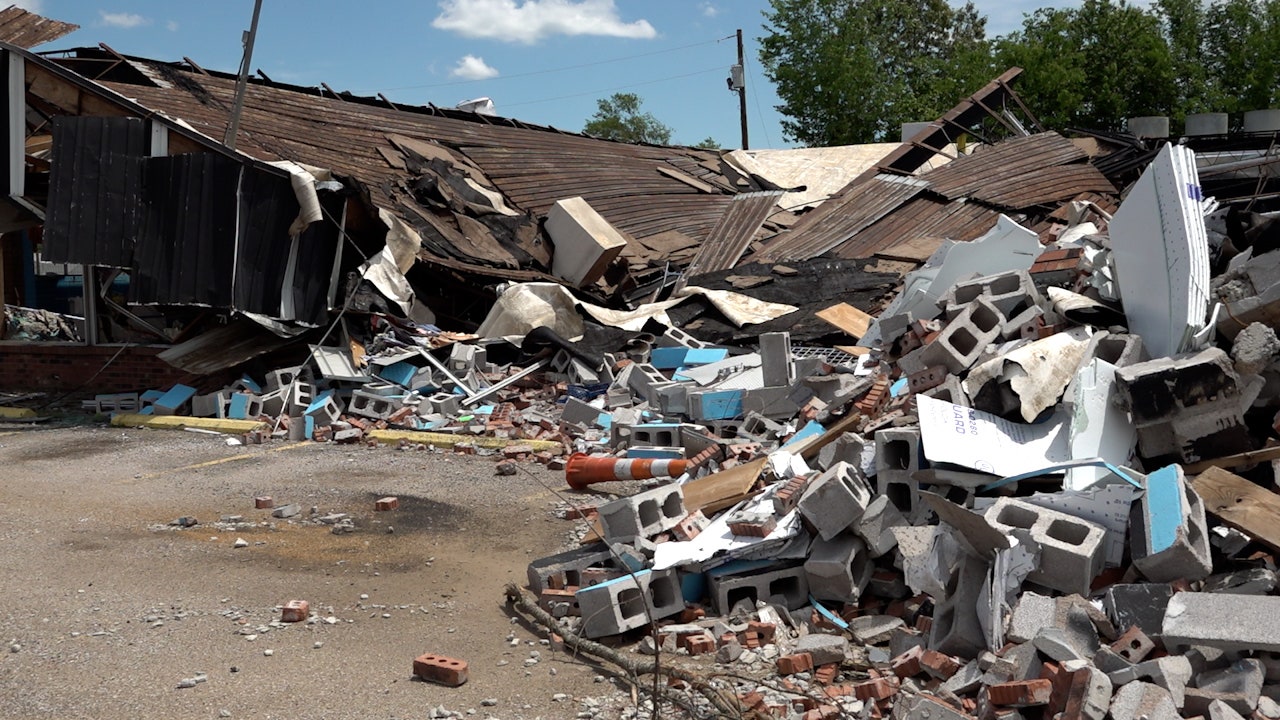The crowd gathered in an angry frenzy, their slogans ringing out across the streets of the Pakistani city of Rawalpindi. “There will be war,” they cried out in unison. “The war will continue till Kashmir is freed. Till India is destroyed. There will be war.”
Just hours earlier, an alleged Indian drone had crashed amid the food stalls outside the cricket stadium, injuring a passing civilian. It was one of at least 25 drones that Pakistan claimed India had sent into Pakistani territory overnight, in what they described as a “another blatant military act of aggression”.
The previous night, India had carried out the most extensive airstrikes on Pakistan in decades, as it used missiles and drones to target nine locations across the country.
India said it had struck only “terrorist infrastructure”, including alleged headquarters and training camps of militant groups behind some of the deadliest terror attacks carried out on India soil. However, women and several children were among the 31 killed in the strikes.
After India’s alleged second incursion involving drones, which were shot down deep inside Pakistani territory early on Thursday, the mood on the streets of Rawalpindi was one of rage. The crowd had a single demand: “Attack India and destroy India,” they roared. “Hail Pakistan’s military.”
Since the partition of India and the formation of Pakistan in 1947, the two countries have fought four wars. While people-to-people sentiments have often softened in times of peace, any sign of cross-border aggression is known to ignite deep-rooted suspicions and outright anger, and is often met with calls for powerful retaliation.
In Rawalpindi – home to the headquarters of Pakistan’s military – there was deep frustration that Pakistan had yet to hit back at India after the strikes.
Usman Ali, 20, a tailor, said the military should not wait any longer to attack India in a show of strength. “They fired missiles at us yesterday and today their drones have attacked Punjab again,” he said. “ We should respond to their military strike with more and more powerful military strikes inside Pakistan. Our military should not be silent. They should destroy India. They want a war. We must give them one very soon.”
The strikes on Wednesday were the first time since the 1971 war that India had launched missiles into Pakistan’s most politically and militarily important province of Punjab. For many in the country, it was seen as a direct provocation that could not be ignored.
“What are we waiting for? Are we not a dignified and brave nation? Our military must strike now,” said a government servant, who asked to remain anonymous.
Many have argued that all-out war with India is the last thing that Pakistan needs. It is already fighting a shadow war with Taliban militants along the border with Afghanistan and with separatist militants in Balochistan, and is still emerging from a financial crisis that has left many Pakistanis facing severe economic hardship.
Even a few weeks ago, as the two countries exchanged mounting threats, the appetite for a hot war with India had remained largely lacklustre in Pakistan.
However, this week’s aggressions have changed sentiments entirely, cutting across political divides and economic background, from vendors to students and lawyers. Nabeel Najaf, 34, a government employee, said that India was now “taking advantage” of Pakistan’s restraint. “They want a war. The Pakistan military and the army chief should give them a war,” she said.
The decision on how Pakistan will respond now rests with its powerful military, in particular its chief, Gen Asim Munir. He is known for his hardline stance on India and his appetite for action over diplomacy, so many in the country believed that retaliatory strikes were imminent, especially given frustrations within the army rank-and-file at the lack of decisive action so far.
Pakistan’s military has historically commanded vast loyalty among the masses, but that has been eroded in recent years. How Munir chooses to respond to India, and the success of any operation, could either re-ignite Pakistan’s faith in its powerful generals or push the establishment into greater crisis.
Yet not all in the country were baying for war. “The world must play its role to de-escalate the conflict,” said Yousaf Nisar, 30, a software engineer. “The world powers are sleeping, sadly. If Pakistan strikes back, India will retaliate and this will go out of control into a full-fledged war.”
The consequences of war for Pakistan would be “unbearable”, said Nasir. “People think war is a joke but imagine the cost to human lives, infrastructure, our economy.”
Over the border in India, a similar appetite for the full force of the military to rain down on Pakistan had been circulating for weeks, after a militant attack in Indian-controlled Kashmir killed 26 people. India accused Pakistan of involvement in the attack, in which Hindu men were singled out for their religion and killed, horrifying the Hindu-majority country.
After Wednesday’s strikes, a mood of jubilance gripped Delhi. “I thought it was a very smart strike by India,” said Amitav Gosal, a lawyer in Delhi. “Pakistan can’t get away with being a haven for terrorists who sit over the border and plot to kill innocent Indians. Taking out those terrorist camps makes us all safer.”
Yet others expressed anxiety, as fears of a Pakistan military response and an escalation of the conflict mounted on Thursday. Sheikh Abir, a security guard, shook his head nervously at the prospect. “We have seen this issue with Pakistan many times before,” he said. “It never ends well.”
.png)
 German (DE)
German (DE)  English (US)
English (US)  Spanish (ES)
Spanish (ES)  French (FR)
French (FR)  Hindi (IN)
Hindi (IN)  Italian (IT)
Italian (IT)  Russian (RU)
Russian (RU)  6 hours ago
2
6 hours ago
2









Comments